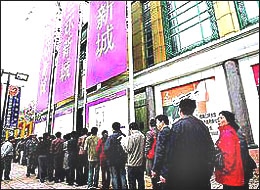
While goods provided by the market are in great supply in China's flourishing economy, public goods are in great shortage.
On June 13, over a thousand applicants queued in the scorching sun in a long line that extended for more than 500 meters in order to buy an affordable flat in Tiantongyuan on the outskirts of Beijing.
Affordable housing, as a part of the social security system aimed at low-income families, is in short supply in the capital. According to the National Bureau of Statistics (NBS), investment in affordable housing construction accounted for only 10 percent of total investment in residential housing construction in 2004 – only slightly higher than the 7 percent in the first five months of this year.
On July 16 and 17, 2,500 students from 19 schools in 17 villages received immunization from a local epidemic prevention station in Sixian County, Anhui Province, and around 300 were taken ill afterwards. Though the vaccines used were proved safe later, the chaos in their purchase and supply by grassroots organizations revealed hidden hazards for public health in rural areas.
Back in 2003, the outbreak of SARS (severe acute respiratory syndrome) also showed a lack of public health emergency mechanisms, disease prevention and control systems, etc.
Other public goods such as basic education, environmental protection, basic laws and regulations are all in short supply.
China is now entering a period with increasing demand for public goods. International experiences indicate that as per capita GDP exceeds US$1,000 and heads towards US$3,000, the demand for public goods will expand rapidly. Modernization in this period is mainly based on public services.
The country is now at such a stage with per capita GDP exceeding US$1,000 in 2003. People have shifted focus from demand for enough food and clothing to that for public services such as education, medical treatment and sanitation.
The gap between cities and the countryside is widening. For a long time, China's public goods have been mainly provided to city and town residents. However, the majority population of 800 million farmers does not have adequate access to government financed public goods.
The minimum living standard system was initiated in 1997. By May 2002, 3.38 million people in rural areas were covered by it, accounting for 10 percent of rural poor. However, those under the umbrella of the system are mostly households enjoying the five guarantees and disabled people who have lost the ability to work, making it more like social relief.
Prices of medical treatment and medicines have been set according to the income of urban people. Farmers, on incomes only one sixth that of urban people, cannot afford them.
Also widening is the gap between rich and poor. According to the white Paper entitled China's Employment Situation and Policies, there is now a surplus of 150 million rural laborers who need to be shifted to non-agricultural industries or to cities, and over 11 million laid-off workers who need to be reemployed.
According to a World Bank report, China's Gini Coefficient, an international index used to measure income distribution, now stands at 0.458, higher than the internationally recognized alarm threshold of 0.4. NBS figures show the richest 10 percent of the population possess 45 percent of the total wealth in China, while the poorest 10 percent only possess 1.4 percent.
China now has an increasing number of migrant people who have become an important part of their adopted cities. However, many policy barriers in education, social security, permanent residency and employment have prevented them from having equal rights. Basic legal guarantees are greatly needed.
China is gradually growing into a citizens' society from one that takes official rank or status as the only criterion for judging one's social worth. A citizens' society accentuates interaction between government and citizens.
Government should take measures based on public opinion and the public should participate in and supervise the establishment and implementation of public policies.
In the establishment of a citizens' society, public demand for information on risk-prevention and policy development increases, but that supplied is often too little, too late and inaccurate or vague, and citizens don't have enough channels to voice their opinions.
(China.org.cn by Yuan Fang August 1, 2005)
|

